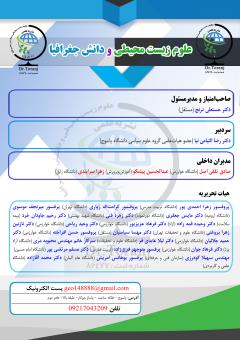تحلیل محتواي کتابهای فارسی نیمه دوم دوره ابتدایی (پایه چهارم) بر اساس عوامل خلاقیت گیلفورد
محورهای موضوعی : علوم برنامه ریزیمریم واحدی 1 , زینب رهبر 2 , حدیثه خشت زر 3
1 - دانشگاه یاسوج
2 - دانشگاه بلهزار یاسوج
3 - دانشگاه هرمزگان
کلید واژه: تحلیل محتوا, کتاب فارسی, پایه ابتدایی, عوامل خلاقیت گیلفورد, تفکر همگرا, تفگرواگرا,
چکیده مقاله :
هدف اصلی از پژوهش حاضر تحلیل محتواي کتابهای فارسی نیمه دوم دوره ابتدایی (پایههای چهارم) بر اساس عوامل خلاقیت گیلفورد بوده است. بر اساس جامعه آماري کتاب فارسی تعیین گردیده است و ابزار اندازهگیری، محتواي دو کتاب فارسی یعنی کتاب خوانداري و نوشتاري (در پایههای چهارم) و فرم محقق ساخته میباشد. بهمنظور تحلیل محتوا از روش واحد ثبت در زمینه استفادهشده است و با استفاده از جداول، فراوانی و درصد به توصیف و تحلیل دادهها پرداختهشده است. روایی ابزار اندازهگیری از طریق فرمول در پایه پنجم، 33/ 91 % در پایه چهارم، 66 / 94اسکات و با روش ضریب توافق متخصصان به میزان % 90در پایه ششم توافق و پایایی ابزار بر اساس روش ضریب توافق زمانی طی سه ماه متوالی با انجام پذیرفت. تحلیل و تفسیر دادهها بر اساس spss استفاده از فرمول همبستگی پیرسان و نرمافزار شاخصهای آمار توصیفی و از فرمول آزمون تفاوت فراوانی با اتکا بر فرمول کاي اسکوتر (خی دو) تک متغیر مورد تحلیل قرار گرفت. نتایج این پژوهش نشان داد که: بیشتر محتوا و تصاویر کتابهای فارسی(خوانداري و نوشتاري) هر سهپایه در سطح حافظه شناختی قرار دارند و به سطح تفکر واگرا و ارزشیاب کمتر توجه شده است. در ضمن بر اساس نتایج بهدستآمده در زمینه فعالیتها و تمرینات هر دو کتاب نشان دادهشده است که در پایه ششم سطح تفکر همگرا، حافظه شناختی و تفکر واگرا از تعادل نسبتاً خوبی برخوردار میباشد. در پایه پنجم در فعالیتهای بخوانیم به تفکر همگرا بیشتر توجه شده است و در تمرینات بنویسیم به سطح واگرا بیشتر توجه شده است. در پایه چهارم بیشتر به حافظه شناختی توجه شده است.
The main goal of the current research was to analyze the content of Persian books in the second half of the elementary school (fourth grades) based on Guilford's creativity factors. It has been determined based on the Persian book statistical society, and the measurement tool is the content of two Persian books, i.e. reading and writing books (in the fourth grades) and the researcher-made form. In order to analyze the content, the registration unit method has been used in the field, and the data has been described and analyzed using tables, frequency and percentage. The validity of the measurement tool through the formula in the fifth grade, 91.33% in the fourth grade, Scott's 94.66 and with the agreement coefficient method of experts at 90% in the sixth grade, and the reliability of the tool was accepted based on the time agreement coefficient method during three consecutive months. . Analysis and interpretation of data based on spss, using Pearson's correlation formula and descriptive statistics software, and using the frequency difference test formula, relying on the chi-square (chi-two) single-variable formula, were analyzed. The results of this research showed that: Most of the content and images of Persian books (reading and writing) of each level are at the level of cognitive memory, and less attention has been paid to the level of divergent and evaluative thinking. In addition, based on the results obtained in the activities and exercises of both books, it has been shown that in the sixth grade level of convergent thinking, cognitive memory and divergent thinking have a relatively good balance. In the fifth grade, more attention is paid to convergent thinking in reading activities, and more attention is paid to divergent thinking in writing exercises. In the fourth grade, more attention is paid to cognitive memory.
• شعباني ، زهرا، ( 1383 ) بررسي تطبيقي برنامه ي تربيت معلم ايران و چند كشور جهان، فصلنامه ي تعليم و تربيت، سال بيستم، شماره 3، پائيز.
• طرح كليات نظام آموزش و پرورش جمهوري اسلامي ايران ( 1367 ) وزارت آموزش و پرورش،خرداد ماه.
• ملكي، حسن ( 1380 ) ، صلاحيت هاي حرفه اي معلم، تهران، انتشارات مدرسه.
• وزارت آموزش و پرورش ( 1381 ) آئين نامه ها و مقررات مربوط به تربيت معلم، تهران، معاونت نيروي انساني.
• وزارت آموزش و پرورش ( 1382 ) مجموعه مصوبات شوراي عالي آموزش و پرورش، تهران،انتشارت مدرسه.
• يونيسف، تربيت معلم به سوي الگويي تازه براي معلمان، ( 1377 ) ترجمه فريبرز مجيدي،پژوهشكده تعليم و تربيت، چاپ اول.


